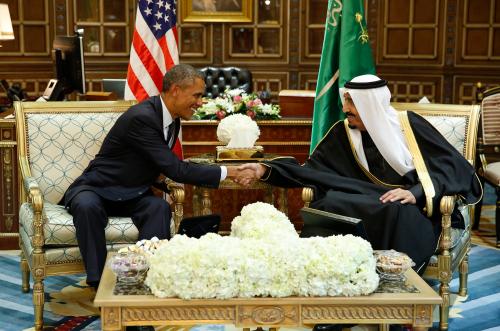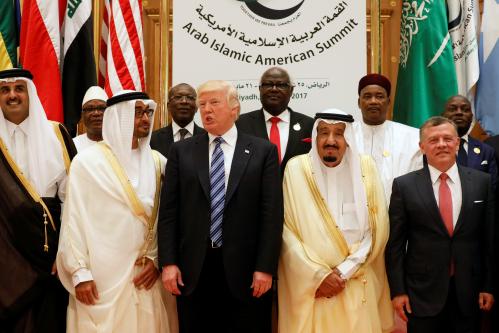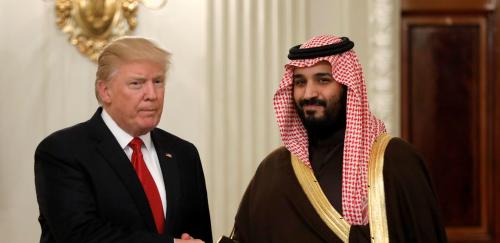Congress’ override of President Obama’s veto to allow Americans to sue Saudi Arabia for links to the 9/11 plot raises many questions, not least of which is the relationship between Saudi Arabia and terrorist groups today. As I testified earlier this year, Saudi Arabia has made considerable progress on counterterrorism in the last 15 years but still has a long way to go.
Before the September 11, 2001 terrorist attacks, and really until al-Qaida began to attack the Kingdom directly in May 2003, Saudi Arabia was often uncooperative on counterterrorism and more part of the problem than part of the solution. Since 2003, the Saudi regime has emerged as a vital counterterrorism partner, and several important successes against al-Qaida in particular are due in large part to Saudi cooperation. Yet it’s not a simple story of progress: the Kingdom engages in many troubling behaviors today that make the terrorism problem worse. In the end, policymakers would do well to remember that Saudi Arabia is a key partner but not a friend: the United States and Saudi Arabia share many common interests, but they do not share common values or a common worldview.
What’s the link, exactly?
Understanding Saudi Arabia’s relationship with terrorists, however, is far more difficult than assessing Iran’s backing of terrorism, which is open, extensive, and state-sponsored. Much of Saudi support is done by non-state actors. Yet being “non-state” does not absolve the Saudi government of responsibility. These non-state actors enjoy a range of relationships to the Saudi regime. Some receive or did receive official patronage. Others, particularly those tied to leading clerics in the Kingdom, are embraced indirectly by the regime’s self-proclaimed role as Defender of the Faithful. And still others are truly private, acting independently of the government and in times in opposition to it.
In addition, the Saudi royal family itself occupies an unusual role. In one sense, the royal family—with its tens of thousands of princes—is not the government. However, the family’s and the government’s finances are interwoven, and if a prince supports a group it has an unofficial imprimatur of approval. King Salman himself, for example, helped raise money for the mujahedin in Afghanistan and the Balkans.
Many of these voices are responsible for indoctrination rather than direct violence. That is to say they might propagate views on the Satanic nature of Jews, the apostasy of Shiites, or the heretical nature of the Ahmadiyyas, as well as the legitimacy of using violence to fight foreign occupiers of Muslim lands—be it Indian forces in Kashmir, U.S. forces in Iraq, or Israeli forces in historic Palestine. Such support, in the United States, would often be considered distasteful but part of protected free speech. For terrorists, however, it can prove invaluable as it provides theological legitimacy for their actions, enabling them to attract recruits and funds.
Behind-the-scenes pressure
Washington’s ability to influence the Kingdom is limited, however, given the Saudi domestic sensitivities of these issues. U.S. pressure under the Bush and Obama administrations has moved Saudi Arabia away from many dangerous activities and has helped transform Saudi capacity in fighting terrorism. Even if the key motivation was the change in the perceived threat to the Kingdom itself rather than U.S. influence, these are considerable successes that deserve recognition.
Changing Saudi policy still further is difficult. Although the United States has sold the Kingdom almost $100 billion in arms during the Obama administration, the Saudi media remains critical of the president as unreliable and hostile to the Kingdom. Riyadh, moreover, is frustrated with U.S. policy regarding Iran in particular, but also in the region in general. Saudi Arabia backed the coup in Egypt, in opposition to U.S. policy, and Saudi leaders were previously outraged that the United States abandoned the Mubarak regime. The Obama administration has largely abandoned criticizing the Saudi regime on human rights grounds, but it is important to remember that most Saudis do not share U.S. values regarding women’s and homosexual rights, religious liberty, and other basic freedoms that are fundamental to American society.
Quiet pressure is almost always best when trying to change Saudi policy.
Many issues regarding counterterrorism—particularly the promotion of extremism abroad via sectarianism and criticism of non-Muslims—touch on core domestic political issues vital to the regime’s legitimacy and very survival. Change in these areas will at best be slow, and the United States should expect progress to end or even reverse should the regime’s domestic situation face challenges.
Quiet pressure is almost always best when trying to change Saudi policy. The small circle of decisionmakers in Saudi Arabia does not take well to public embarrassment, and they believe strongly in the value of close personal relationships. To be effective, U.S. pressure must involve top officials, including the president. Otherwise, it will simply be ignored or may even prove counterproductive.
Saudi Arabia is a vital partner in the struggle to defeat the Islamic State, al-Qaida, and other groups. But it is not a friend. Demonizing Saudi Arabia does not help advance U.S. interests, but nor should critics of U.S. policy in the region see Washington and Riyadh as fully aligned given the profound difference in values.







Commentary
Saudi Arabia and terrorism today
September 29, 2016